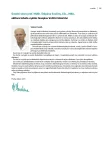Treatment of GLP1 receptor agonists and body mass control
Authors:
Petr Žák; Jindřich Olšovský
Authors‘ workplace:
Diabetologické centrum II. interní kliniky LF MU a FN u sv. Anny Brno, přednosta prof. MUDr. Miroslav Souček, CSc.
Published in:
Vnitř Lék 2015; 61(4): 316-319
Category:
Reviews
Overview
The prevalence of obesity continues to be increasing in all age groups in most countries of the European Union (EU). Many obese people have a history of several successful weight losses, but very few are able to maintain the weight loss over a longer period of time. Initiation of the GLP1 RA administration during weight loss maintenance would inhibit weight loss-induced increases in soluble leptin receptor plasma concentrations resulting in higher level of free leptin thereby preventing weight regain. In contrast initiation of insulin treatment in type 2 diabetes patients is frequently accompanied with weight gain. The GLP1 administration results in HbA1c decrease accompanied with weight loss, presents attractive alternative to basal insulin. The question remains to be answered in the future, if the GLP1 RA administration is generally more frequently started in antiobese than antidiabetes implication.
Key words:
agonists of the GLP1 receptor – diabetes mellitus – obesity
Sources
1. Astrup A. Healthy lifestyles in Europe: prevention of obesity and type II diabetes by diet and physical activity. Public Health Nutr 2001; 4(2B): 499–515.
2. Svačina Š (ed). Klinická dietologie. Grada: Praha 2008. 978–80–247–2256–6.
3. Bantle JP, Wylie-Rosett, Albright A et al. Nutrition recommendations and interventions for diabetes: a position statement of the American Diabetes Association. Diabetes Care 2008; 31(Suppl 1): S61-S68.
4. Wadden TA. Treatment of obesity by moderate and severe caloric restriction. Results of clinical research trials. Ann Intern Medicine 1999; 119 (7 Pt 2): 688–693.
5. Owecki M, Nikisch E, Miczke E et al. Free leptin index as a marker for leptin action in diabetes and obesity: leptin and soluable leptin receptors relationship with HbA1c. Neuro Endocrinol Lett 2010; 31(5): 679–683.
6. Rosenbaum M, Pavlovich K, Leibel RL et al. Leptin reverses weight induced loss induced changes in regional neural activity responses to visual food stimuli. J Clin Invest 2008; 118(7): 2583–2591.
7. Rosenbaum M, Leibel RL. Adaptive thermogenesis in humans. Int J Obes (lond) 2010; 34(Suppl 1): S47-S55.
8. Škrha J (ed). Diabetologie. Galén: Praha 2009. ISBN 978–80–7262–607–6.
9. Alan J Garber. Long-Acting Glucagon-Like Peptide 1 Receptor Agonists A review of their efficacy and tolerability. Diabetes Care 2011; 34(Suppl 2): S279-S284.
10. Williams DL, Baskin DG, Schwartz MW. Leptin regulation of the anorexic response to glucagon like peptid-1 receptor stimulation. Diabetes 2006; 55(12): 3387–3393.
11. Clemmensen C, Chabenne J, Finan B et al. GLP-1-glucagon coagonism restores leptin responsiveness in obese mice chronically maintainde on an obesogenic diet. Diabetes 2014; 63(4): 1422–1427.
12. Iepsen EW, Lundgren J, Dirksen C et al. Treatment with a GLP-1 receptor agonist diminishes the decrease in free plasma leptin during maintenance of weight loss. Int J Obes (Lond) 2014. Dostupné z DOI: <http://dx.doi.org/10.1038/ijo.2014.177>.
13. le Roux C, Lau DCW, Astrup A. Safety and tolerability of liraglutide 3.0 mg in overweight and obese adults: the SCALE obesity and prediabetes randomised trial. Abstract n. 833. EASD 2014 Vienna.
14. Bode B, De Fronzo R, Bergensta R. Effect of liraglutide 3.0 mg and 1.8 mg on body weight and cardiometabolic risk factors in overwight/obese adults with T2D: SCALE Diabetes randomised double blind 56 week trial. Presented oral EASD 2014 and abstract n.181.
15. Owens DR Stepwise intensification of insulin therapy in Type 2 diabetes management – exploring the concept of the basal-plus approach in clinical practice. Diabet Med 2013; 30(3): 276–288.
16. Giorgino F. Efficacy and safety of once weekly dulaglutide vs insulin glargine in combination with metformin and glimepiride in type 2 diabetes patients (AWARD2). Oral presentation (38) EASD 2014 Vienna.
17. Vora J. Combining Incretin Based Therapies With Insulin Realizing the potential in type 2 diabetes. Diabetes Care 2013; 36(Suppl 2): S226-S232. Erratum in Diabetes Care 2013; 36(12): 4172.
18. Raccah D, Lin J, Wang E et al. Once-daily prandial lixisenatide versus once-daily rapid acting insulin in patients with type 2 diabetes mellitus insufficiently controlled with basal insulin: analysis data from five randomized, controlled trials. J Diabetes Complications 2014; 28(1): 40–44.
Labels
Diabetology Endocrinology Internal medicineArticle was published in
Internal Medicine

2015 Issue 4
-
All articles in this issue
- Biosimilar insulines – new possibilities of diabetes treatment
- The treatment of diabetes in patients with liver and renal impairment
- Possibilities of therapy GLP1 RA for diabetics with nephropathy
- Treatment of GLP1 receptor agonists and body mass control
- Treatment of an elderly patients with diabetes
- Issues of infection related to diabetic foot syndrome
- Treatment of hypertension in diabetes mellitus
- Physical activity in patients with microvascular complications of diabetes
- Glycation of lens proteins in diabetes and its non-invasive assessment – first experience in the Czech Republic
- miRNA-192, miRNA-21 and miRNA-200: new pancreatic cancer markers in diabetic patients?
- Progress in the development of insulin pumps and their advanced automatic functions
- The microbial flora in the digestive tract and diabetes
- Myokines – muscle tissue hormones
- The position of new antidiabetics in clinical practice: SGLT2 vs DPP4 inhibitors
-
Do diabetologists choose a therapy rationally?
Basic results of the PROROK project (A prospective observation project to assess the relevance of the difference between fasting glycemia and postprandial glycemia to estimation of success of type 2 diabetes therapy)
- Internal Medicine
- Journal archive
- Current issue
- Online only
- About the journal
Most read in this issue
- Myokines – muscle tissue hormones
- The treatment of diabetes in patients with liver and renal impairment
- Treatment of GLP1 receptor agonists and body mass control
- Treatment of hypertension in diabetes mellitus
